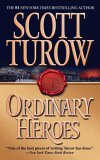Summary | Excerpt | Reading Guide | Reviews | Beyond the Book | Readalikes | Genres & Themes | Author Bio

1.
STEWART: ALL PARENTS KEEP SECRETS
All parents keep secrets from their children. My father, it seemed, kept
more than most.
The first clue came when Dad passed away in February 2003 at the age of
eighty-eight, after sailing into a Bermuda Triangle of illness—heart disease,
lung cancer, and emphysema—all more or less attributable to sixty years of
cigarettes. Characteristically, my mother refused to leave the burial details to
my sister and me and met the funeral director with us. She chose a casket big
enough to require a hood ornament, then pondered each word as the mortician read
out the proposed death announcement.
"Was David a veteran?" he asked. The undertaker was the cleanest-looking man I'd
ever seen, with lacquered nails, shaped eyebrows, and a face so smooth I
suspected electrolysis.
"World War II," barked Sarah, who at the age of fifty-two still raced to answer
before me.
The funeral director showed us the tiny black rendering of the Stars and Stripes
that would appear in the paper beside Dad's name, but my mother was already
agitating her thinning gray curls.
"No," she said. "No war. Not for this David Dubin." When she was upset, Mom's
English tended to fail her. And my sister and I both knew enough to keep quiet
when she was in those moods. The war, except for the bare details of how my
father, an American officer, and my mother, an inmate in a German concentration
camp, had fallen in love, virtually at first sight, had been an unpleasantness
too great for discussion throughout our lives. But I had always assumed the
silence was for her sake, not his.
By the end of the mourning visitation, Mom was ready to face sorting through
Dad's belongings. Sarah announced she was too pressed to lend a hand and headed
back to her accounting practice in Oakland, no doubt relishing the contrast with
my unemployment. Mom assigned me to my father's closet on Monday morning,
insisting that I consider taking much of his clothing. It was nearly all
disastrously out of fashion, and only my mother could envision me, a longtime
fatso, ever shrinking enough to squeeze into any of it. I selected a few ties to
make her happy and began boxing the rest of his old shirts and suits for
donation to the Haven, the Jewish relief agency my mother had helped found
decades ago and which she almost single-handedly propelled for nearly twenty
years as its Executive Director.
But I was unprepared for the emotion that overtook me. I knew my father as a
remote, circumspect man, very orderly in almost everything, brilliant, studious,
always civil. He preferred work to social engagements, although he had his own
polite charm. Still, his great success came within the mighty fortress of the
law. Elsewhere, he was less at ease. He let my mother hold sway at home, making
the same weary joke for more than fifty years—he would never, he said, have
enough skill as a lawyer to win an argument with Mom.
The Talmud says that a father should draw a son close with one hand and push him
away with the other. Dad basically failed on both accounts. I felt a steady
interest from him which I took for affection. Compared to many other dads, he
was a champ, especially in a generation whose principal ideal of fathering was
being a 'good provider.' But he was elusive at the core, almost as if he were
wary of letting me know him too well. To the typical challenges I threw out as a
kid, he generally responded by retreating, or turning me over to my mother. I
have a perpetual memory of the times I was alone with him in the house as a
child, infuriated by the silence. Did he know I was there? Or even goddamn care?
Now that Dad was gone, I was intensely aware of everything I'd never settled
with him—in many cases, not even started on. Was he sorry I was not a lawyer
like he was? What did he make of my daughters? Did he think the world was a good
place or bad, and how could he explain the fact that the Trappers, for whom he
maintained a resilient passion, had never won the World Series in his lifetime?
Children and parents can't get it all sorted out. But it was painful to find
that even in death he remained so enigmatic.
Excerpt from Ordinary Heroes by Scott Turow. Copyright 2005 by Scott Turow. Published by Farrar, Straus and Giroux, LLC in 2005. All rights reserved. Visitors to this web site are warned that this work is protected under copyright laws and reproduction is strictly prohibited. Permission to reproduce the material in any manner or medium must be secured from Farrar, Straus and Giroux, LLC.




When an old man dies, a library burns to the ground.
Click Here to find out who said this, as well as discovering other famous literary quotes!
Your guide toexceptional books
BookBrowse seeks out and recommends the best in contemporary fiction and nonfiction—books that not only engage and entertain but also deepen our understanding of ourselves and the world around us.